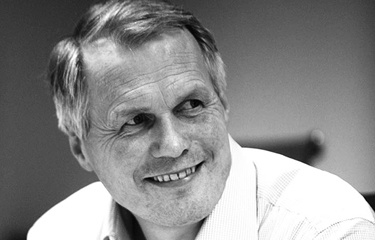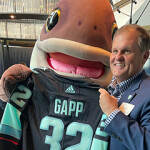SalMar appoints new CEO as Ervik moves to head up new ocean farming unit

Gustav Witzøe has taken over as CEO of SalMar with immediate effect as former CEO, Olav Andreas Ervik, becomes managing director of new ocean-based fish farming subsidiary SalMar Ocean AS, the Norwegian salmon farming company has announced.
SalMar’s initiatives in ocean-based fish farming have to-date been organized as a business area within SalMar and headed by Gustav Witzøe. These activities have now been transferred to a subsidiary, which Ervik wanted to lead, the company said.
“By establishing SalMar Ocean, SalMar makes another move to strengthen its leading position in the development of ocean-based fish farming,” said Witzøe. “Our ambition is to lead the development of environmentally sustainable seafood production in exposed ocean areas.”
The group recently released a new generation of fish in its offshore cage Ocean Farm 1. Meanwhile, subsidiary MariCulture AS is finalizing the design phase of a larger and more advanced offshore cage, Smart Fish Farm, which will be placed in the open sea.
Both these businesses are now part of SalMar Ocean AS.
“We are convinced that ocean-based farming will play an important role in future food production. On the open ocean we have unique opportunities to farm on nature's premises and with minimal environmental impact. I really look forward to taking this initiative further,” Ervik said.
In recent years, SalMar has invested more than NOK 8 billion (USD 876.1 million, EUR 783.9 million) in sustainable growth, mainly in equipment and industrial plants to further develop the company's production capacity and industrial platform.
“The company will continue to be an important part of the industrial seafood cluster in Norway, which is recognized as a world leader in research-based knowledge development and innovation,” Witzøe said. “SalMar aims to work closely with leading knowledge institutions such as NTNU, Sintef and the University of Tromsø, for example by sponsoring professorships to strengthen research in areas relevant to the development of Norwegian aquaculture.”
SalMar processes a significant volume of its salmon internally and aims to maintain its image as “the processing company,” highlighting that processing generates three to four times as much employment and local value creation as exporting whole salmon. It added that processing also offers the opportunity to refine the residual raw material into valuable products such as animal feed and human health products, while processing near farming sites significantly reduces the overall emission of greenhouse cases.
SalMar has previously established the world's largest and most advanced salmon processing plant on Frøya (InnovaMar) and has now started construction of a similar processing plant on Finnsnes in Senja municipality (InnovaNor) in Northern Norway.
“In the years to come, the company will invest large sums in production facilities in several locations along the coast, including significant growth in RAS-based smolt production. In total, SalMar will invest several billion Norwegian kroner in production and industrial facilities in the next few years,” Witzøe said.
Photo courtesy of SalMar






Share